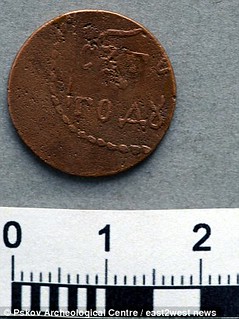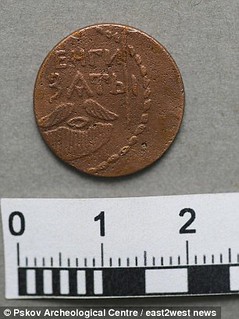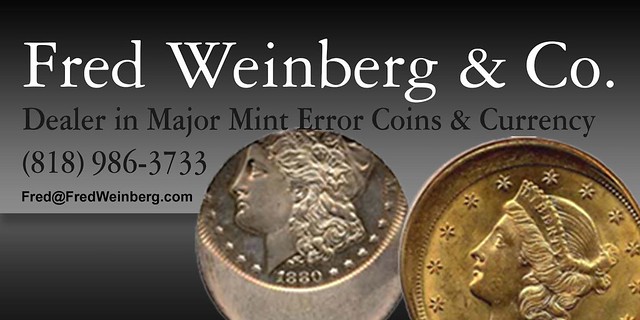
PREV ARTICLE
NEXT ARTICLE
FULL ISSUE
PREV FULL ISSUE
RUSSIAN ARCHEOLOGISTS DISCOVER BEARD TOKENDick Hanscom and John Regitko forwarded this Daily Mail article about a Russian beard token found by archeologists. -Editor   Russian archeologists have found an exceptionally rare 'beard kopek' - a coin that men had to buy under Peter the Great if they wanted to remain unshaven. Minted in 1699, the copper money is only the second known example of the coin that still survives today, and has been described by experts as 'priceless'. It shows an image of a beard and moustache and the words 'Money Paid'. The kopek was part of Peter the Great's 'beard tax' imposed soon after he returned from an incognito trip to Britain in 1697 to learn about Western ways in his bid to modernise Russia. As part of the modernisation imposed after his trip, Peter the Great banned all facial hair unless people paid for a special coin that made them exempt from the rule. The newly found coin was discovered in a ruined 17th Century building in the Russian city of Pskov alongside a haul of 5,000 other ancient coins. The wealthy had to fork out high sums but peasants paid one kopek - the lowest coin of the realm. The 'beard kopeks' acted as a token proving those with facial hair had paid and were expected to be carried at all times. Currently only one other example is known to exist of these coins - and it is held in the Hermitage Museum in St Petersburg. In 1728 - three years after Peter's death - the beard tax coins were removed from circulation, melted down, and made into other money. Second known? Priceless? I know most of the beard tokens we see today are novodels made by the Russian mint to satisfy collectors. Is this discovery an original piece? It does not have a counterstamp, which was used to signify the payment of an additional year's tax, so perhaps this came from the first year of issue. I asked Steve Bishop to help straighten me out. Thanks. -Editor Steve writes: I used to own an original beard token. They are generally dated (in Cyrillic) 1705 (round) or 1725 (rhombic). I think the 1699 version is what they are referring to as "second known" and "priceless". To read the complete article, see: To read an earlier E-Sylum article, ee: MORE ON THE RUSSIAN BEARD TOKENS (http://www.coinbooks.org/esylum_v15n47a14.html)  Wayne Homren, Editor The Numismatic Bibliomania Society is a non-profit organization promoting numismatic literature. See our web site at coinbooks.org. To submit items for publication in The E-Sylum, write to the Editor at this address: whomren@gmail.com To subscribe go to: https://my.binhost.com/lists/listinfo/esylum All Rights Reserved. NBS Home Page Contact the NBS webmaster 
|